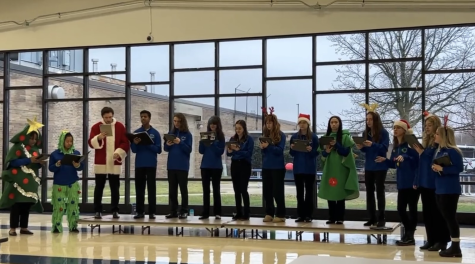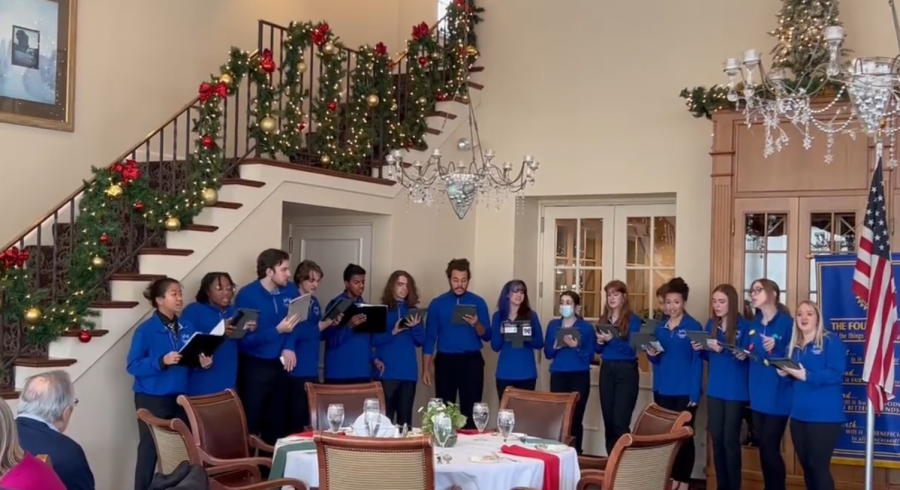No instruments? No problem! : South’s A Cappella Groups Shine
February 8, 2023
Unaccompanied Minors and Treble Threat are two extracurricular a cappella groups at Glenbard South. They are student-run, audition-only groups run by seniors Alina Dukala, Param Sridhar, Maddie Wetle, and choir director Mrs.Elizabeth Hutchinson.
Treble Threat, run by Maddie Wetle, is a soprano and alto or SSA group, which means that the group is made up of soprano 1, soprano 2, and alto voices. Treble Threat is also fully student directed.
Dukala, one of the student leaders for Unaccompanied Minors, explained,“In Unaccompanied [minors] there are female voices and male voices that are included”. In addition, Unaccompanied Minors is student and teacher directed.
A rehearsal for Treble Threat involves sectionals for about twenty minutes. Each song has about three to four parts. Sectionals are where one group of the choir practices their individual part, without the rest of the ensemble. Then the students come back together as a big group and rehearse all of the parts together.
In Unaccompanied Minors the rehearsals switch up every week, between student directed and teacher directed. Sectionals are less often, so most of the rehearsal is in the full group. “You get to put in your input, it’s not like someone is teaching you, we are really all working together, and it’s a lot of fun” said Sam Lullo, member of Unaccompanied Minors and Treble Threat, about both ensembles,
When asked, Lullo said that the best thing about these ensembles were “The people there, everyone’s really funny. It’s mostly just a lot of laughs, but then by the end we always do create a really good product that sounds just incredible.”
“This past December, Unaccompanied Minors went on several different field trips to perform for gigs around the community. We have been to senior centers, Athleta, and a tour around the elementary schools,” says one of the student leaders for Unaccompanied Minors.
During their performances to local elementary schools Unaccompanied Minors demoed what choir was and showed the future South students what it means to be involved with music at a high school level.

“We love doing it. It was certainly very rigorous, but we love it,” Dukala explained about their travels.
Unaccompanied Minors and Treble Threat perform at every choir concert at Glenbard South.
Their recent performances were during the Fall choir concert on October 6th, and the Holiday concert on December 1st which involved choir, orchestra and band. The a cappella groups will perform again in the upcoming choir concert in May.
The extracurricular ensembles are similar in many ways to choir in school. Most of their songs have four parts, and they have similar levels of complexity. Unlike choir class which meets everyday, Treble Threat and Unaccompanied Minors have one day a week to practice. The extracurricular ensembles perform more trending songs, they are an auditioned group, so they are more adept at sight reading and can pick up their part quickly.
“It’s taking your individual skills and applying them in a group setting,” said Lullo.
Dukala shared, “It’s not all work. It’s a lot of fun… We are able to have that balance between joking around and getting a lot of stuff done. It’s a really great balance that I think we benefit from, and keep the enjoyment of being in the group.”
At the end of each school year the leaders of Unaccompanied Minors and Treble Threat hold auditions for the next year’s members. Their auditions are combined. So a student only has to audition once, and they are considered for either of the groups. They post signup sheets and explain what people should prepare for their audition. “For sure audition!” says Lullo, “there will be a lot of spots, a lot of ways to make it your own, make it unique.”
“Hearing your hard work pay off, it’s really rewarding and it’s really cool”, said Dukala.
































